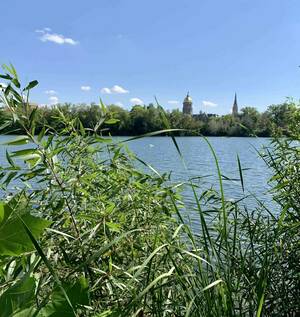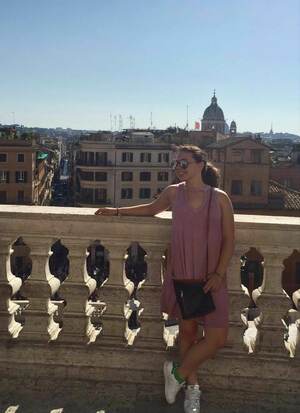Student Reflection: Remote in Rome, Summer in South Bend
Gabriella Hanahan is a senior studying Italian and Film with a minor in Business Economics at the University of Notre Dame. She is involved in the Dome yearbook as a Content Editor and spends her free time working on her website Listenglobally.com, which features music from every country in the world. While her study abroad program was cancelled due to the COVID-19 pandemic, Hanahan reflects on how she was still able to virtually connect with a new county and new culture through an internship at the Vatican.

I was supposed to study abroad for all of my junior year before the COVID-19 pandemic. I was excited to participate in the fully immersive Bologna Consortial Studies Program. I would have Italian roommates and take classes alongside my Italian peers. It was going to be one of the most challenging and rewarding experiences of my life. My friends thought I was crazy. “Gabi, you’re going to forget English while you’re there,” they joked.
The unexpected struck, and my year was canceled.
I wasn’t sure where to rechannel all the excitement I had built up— the excitement to study in an Italian city (Bologna), to immerse with locals, to learn the language better, to experience how the Italian and American cultures and values differ, and to discern a little more of what I want to do with my one life.
I had built up too much of an interest in the country, its language and its culture to let go of this dream I once had. I’d listened to too many hours of Mahmood songs, watched too many Marcello Ascani YouTube videos and struggled through too many pages of the Italian-language version of Percy Jackson.
Yet, my grandpa might be right when he says, “When one door closes, another one opens.”
I continued. I took more language and culture classes. I switched my minor to a supplementary major. I started weekly conversations in Italian with a family friend. I expanded my list of Italian YouTubers that I watch on a regular basis. I journaled thousands of words I didn’t recognize as I came across them.
And finally, I applied for an internship through the Rome Global Gateway. Considering my film major, my five years of experience with yearbook and my general interest in communications and media, the Gateway paired me with an institution that everyone is well familiar with on this Catholic campus—the Vatican.
I spent the summer interning with the Pontifical Academy for Life, or Pontificia Accademia per la Vita (PAV). Pope John Paul II founded the Academy in

1994 to “study, information and formation on the principal problems of biomedicine and of law, relative to the promotion and defense of life, above all in the direct relation that they have with Christian morality and the directives of the Church's Magisterium.” It speaks on the moral implications of issues such as Global Bioethics, Human Genome Editing, Robo-ethics and, in the case of the current global issue, the COVID-19 vaccine.
My role was to contribute a youth perspective to a communication manager who grew up in the era of newspapers. I read, analyzed and provided comments for a variety of documents, including “Rescuing Fraternity— Together,” PAV’s response to Pope Francis’s Fratelli Tutti, written by ten theologians and philosophers from the Academy. My work also focused on the vaccine. I learned more about the church’s position on the COVID-19 vaccine and the struggle to promote it to groups of people where complacency, convenience or confidence deter individuals from receiving it. At the International Roundtable on Vaccination, social ethics professor Stefano Semplici represented PAV and spoke on the importance of religious leaders working at a grassroots level to serve as trusted messengers to combat this concern. I also learned about the church’s mission for equity between countries. According to the conference hosted by PAV, the World Medical Association and the German Medical Association, as of June of 2021, ten countries in the world administered 77% of all the COVID-19 vaccines. PAV stresses the importance of making the vaccine “accessible to the poorest countries in a manner that is not costly for them” as lack of access “condemns poor countries to continue living in health, economic and social poverty” (“Note on the morality of using some anti-Covid-19 vaccines”).
I read the criticism of PAV and its effort to encourage vaccination—videos, articles and online comments from far-right news platforms. As with any great learning experience, I am leaving this internship with more questions than I entered with. If distrust is a central concern, how can we combat it? I would discuss this all with my correspondent Fabrizio Mastrofini every week. I’m ending my internship with a greater understanding of the complexities of speaking to diverse audiences coming from one church and mission and the complexities of advocating for change that is not easy or simple. This internship gave me a look into a very different field of communication than I’m used to and was an amazing learning experience.
Returning to the mindset of my grandfather— the pandemic led to the cancellation of my study abroad program, which opened the opportunity to this virtual internship in Rome, an internship that explores a solution to decreasing the harm of the global pandemic that started this cycle in the first place.
It wasn’t until I was writing this article that I realized this internship was a rechanneling of all the excitement I had built up for Bologna— the excitement to work in an Italian city (Rome), to immerse with locals, to learn the language better, to experience how the Italian and American cultures and values differ and, finally, to discern a little more of what I want to do with my one life.
Learn more about opportunities in Rome.